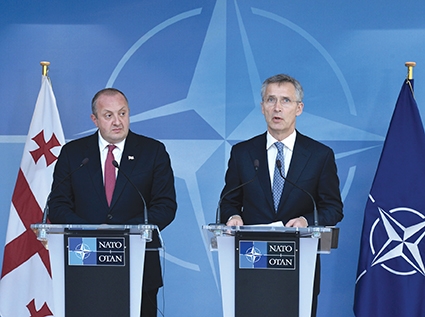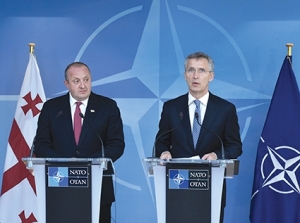Resetting Georgia-NATO Relations
Following the 2016 NATO Summit in Warsaw, it seems clear that Georgia has little chance of being granted a Membership Action Plan. However, it is evident that a business-as-usual approach towards its relationship with NATO is ill-advised. Top officials from both Georgia and NATO now need to sit down for a serious brainstorming session to iron out their differences on difficult issues and set out new guidelines for relations going forward.
The last eight years have exposed the eternal lack of consensus among NATO member states, starting with the infamous Summit in Bucharest where NATO’s open door policy towards Georgia was proclaimed. They have also highlighted Georgian officials’ exaggerated expectations and optimism about this issue. Following the 2016 NATO Summit in Warsaw, it seems clear that Georgia has little chance of being granted a MAP and, as a result, the country remains in limbo. Furthermore, were Georgia to be offered a substitute for a MAP by NATO, perhaps an Associated Partnership, it would not ease the feeling of disappointment or even betrayal inside the country.
The biggest question that remains unanswered by both Georgian and NATO officials is the nature of relations between the two after the Warsaw Summit. Will Georgian officials realize that Georgia is a close “partner” and not a NATO “member”? That the process of membership has come to a standstill and needs to be reinvigorated but lacks new content? Or will they continue to delude themselves, as has been the case over the last eight years, in order to not lose their spirit of optimism and maintain their country’s Euro-Atlantic orientation? Will NATO speak with one voice and say loud and clear that the Alliance’s open door policy towards Georgia has failed and that the door is, in reality, shut? Or will NATO’s ambiguity continue as if nothing has happened?
Unanswered questions
Undoubtedly, both NATO and Georgian officials are frustrated by the situation, since NATO’s words do not reflect NATO’s deeds, while Georgia’s expectations have failed to materialize. The implicit veto that Russia has over Georgia’s desire to join the Alliance hangs over that country like the Sword of Damocles, despite repeated statements by western politicians and diplomats that Russia has no such veto.
Although Chancellor Angela Merkel, French President François Hollande and United States President Barack Obama said “no” to a Georgian MAP, European
NATO officials have kept a low profile, failing to clearly articulate that Georgia’s chances of receiving a MAP were, and still are, very low. On the other hand, American NATO officials have been more forthcoming, since they have felt obliged to be frank, blunt and less constrained by political correctness.
There is no doubt whatsoever that the European leaders’ official political correctness hindered them when it comes to speaking clearly on this crucial issue. At the same time, Georgian officials have made a grave mistake by not challenging European NATO officials on the issue of a MAP or membership. On the other hand, maintaining a calm and amicable position has not helped Georgia. In the end, their officials are left with plenty of unanswered questions and thus have a difficult task in trying to convey a clear message to ordinary Georgians.
Disappointment and anger
Bearing all this in mind, what can we expect from Georgian officials after the Warsaw Summit?
What Georgian leaders have to understand and acknowledge is that they were the ones who failed to revise their policies and relations with NATO over the last eight years. Today, they urgently need not just revision, which is long overdue, but a whole new way of thinking, a new approach and finally, a new understanding with NATO. On the other hand, NATO is likely to be very reluctant to admit that its consistent open door policy towards Georgia has failed. Even so, NATO has to realize that its open door policy, which successfully brought Albania and Croatia into NATO in 2008 and which has recently led to Montenegro being invited to join, cannot be equaled by granting Georgia a MAP and ultimately bringing it into the Alliance. The decision to grant Georgia a MAP means that the Alliance is ready to defend Georgia against Russia, even though Georgia is not yet a member. The threat of Russia attacking Georgia cannot be underestimated and is very real.
Defending Georgia remains the most difficult issue for the Alliance to unanimously agree upon. NATO pursues a very cautious approach towards Russia, not because it is afraid of it but because it understands that confrontation with Russia would require the support of the EU population, would be very costly and would create a heavy burden for the allied leaders to carry. These crucial points are neither explained nor understood in Georgia and, as a result, need to be conveyed and explained at length to both Georgian politicians and ordinary Georgians alike.
What is evident is that after the Warsaw Summit, both Georgian and NATO top officials need to sit down for a serious brainstorming session to iron out their differences on difficult issues and set out new guidelines for Georgia-NATO relations. Transparency aside, certain parts of these new guidelines should be conveyed to the Georgian public. They should receive a clear explanation as to why NATO has failed to bring Georgia into the Alliance over the last eight years. Jens Stoltenberg, the Secretary General of the Alliance, should clearly state that: “Yes, Georgia is our closest partner but is not a member, since the Alliance lacks consensus on that issue.”
Being honest with himself and with the Georgian public will help mitigate the feeling of betrayal and disenchantment that Georgians are currently feeling towards NATO. Furthermore, Stoltenberg’s statement would help counter Russia and Russian sympathizers in Georgia who claim that: “We informed you Georgians all along that NATO was not ready to bring you in. You never believed us and clung to the hope that the indecisive Alliance would stick to the promise it made at the Bucharest Summit back in 2008. It is time to face the facts.”
To start anew
Several key points outlined below should be taken into consideration when determining the best way to reset relations following the Warsaw Summit: First and foremost, Stoltenberg should state loudly and clearly that a MAP is obligatory for Georgia. It is also of the utmost importance that the North Atlantic Council (NAC), as the principal decision-making body of NATO, reinforces Stoltenberg’s statement that a MAP is not just important but crucial for Georgia. Countries that receive a MAP are not simply Alliance aspirants, but official candidates for NATO membership. Thus, it is critical to emphasize the linkage between a MAP and membership to Georgian officials and the expert community in Georgia.
Second, discussions in Georgia about receiving a MAP should be toned down, de-politicized and the Georgian leadership should ultimately be sober-minded about the chances of Georgia quickly getting a MAP.
Third, there is a notion in Georgia that “We Georgians are entitled.” As a result of the country’s progress in following NATO and EU guidelines in pursuing various reforms and strengthening democracy, Georgia feels that it deserves to get NATO membership. This sense of entitlement needs to be toned down. For those impatient Georgians who live in the shadow of a belligerent Russia, this is easier said than done. Nevertheless, both sides need to determine how to solve the issue of strategic patience. It should also be stressed that questions such as when Georgia will receive a MAP will be asked repeatedly.
Fourth, NATO constantly praising Georgian achievements (particularly in Afghanistan) whilst at the same time pouring cold water on that country’s expectations, confuse and exasperate Georgians. Therefore, NATO officials need to be forthright.
Fifth, European and American NATO experts on strategic communications should form a link between NATO, Georgian officials and ordinary Georgians. This team of experts must have expertise in Georgian domestic, foreign and security policy and be capable of delivering concise and precise messages from NATO to Georgia and back. They also need to be fluent in Russian. This point is of utmost importance, since the team should debate NATO issues throughout Georgia, not just in the capital, Tbilisi. It is up to NATO and Georgian officials to agree whether or not one of the aims of this team is to counter Russian anti-NATO propaganda, as well as some of Georgia’s political anti-NATO rhetoric.
is no guarantee that these suggestions will be seriously considered by either side. However, without a new impetus in bilateral relations, Georgia has little chance of overcoming its impasse, while NATO’s eternal lack of consensus will remain a stumbling block. The only winner in this situation will be Russia. In the end, acrimony and accusations may fly, but they do not help Georgia or NATO under the current, difficult circumstances.
Kogan is a defense and security expert affiliated with the Tbilisi-based Georgian Foundation for Strategic and International Studies.
Eugene Kogan












